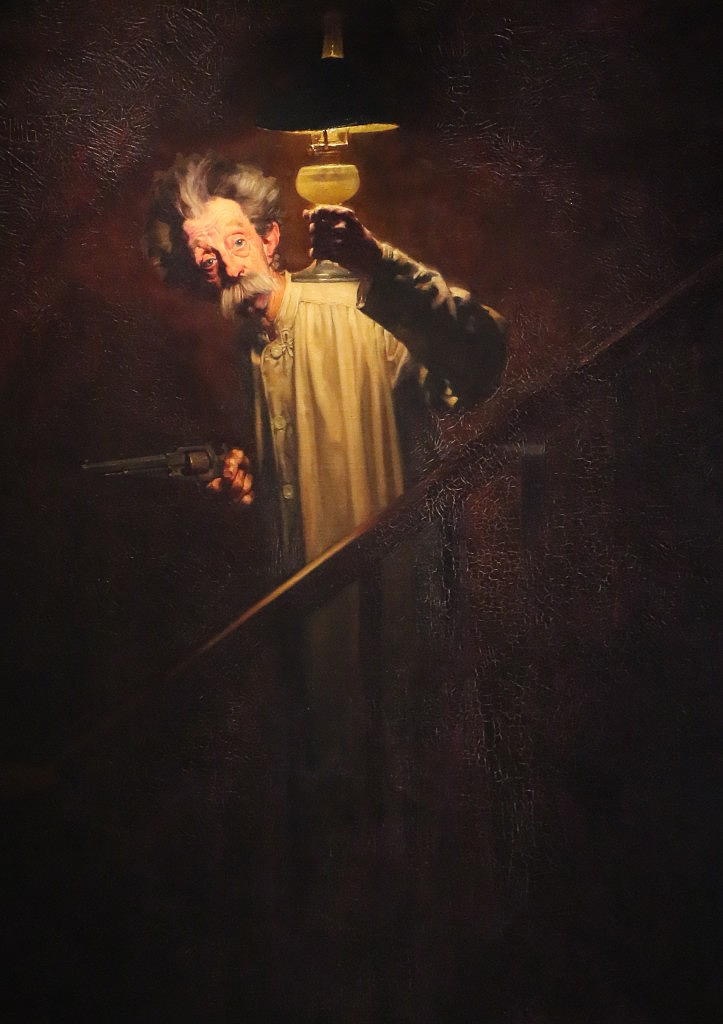OtherWorlds

Norman Rockwell: General Electric Promotional Poster
"What a Protection Electric Light Is." (1925)
"We must be blind to enter OtherWorlds …"
©2022 by David A. Schmaltz - all rights reserved
Authoring intrudes upon OtherWorlds. Even when producing a work of current affairs, currency quickly slips into the recent past before further immersing itself into even foggier history. Our current world quickly shifts into OtherWorlds, too, its literature—fiction, non-fiction, reference—probably irrelevant for its original intentions. Even our current world, slippery though it might seem, favors certain orders. It wants originality but not unfamiliarity. It wants inventive similarity, not precisely a copy, for that might border on plagiarism or worse, produce a derivative work. It wants an urgency, as if a work should carry a critical message such that receiving it might stave off some catastrophe. It might seek the avant garde but rarely the weird. Beatniks without beards. Hippies with clean hair and pressed jeans. A reassuring future.
Any author seeking sanity should probably consider changing careers or just stop listening to what anyone insists that they want them to produce. No individual very accurately represents the wants of very many readers, and few authors can produce tone or tenor on demand, their gifts extending short of contract production. An author might be exploring into new worlds, but even the best of them carry little notion of what they're investigating and what they might uncover. Writing's such an arcane means for discovering what anyone might be thinking, that it would be foolish to employ it to merely transcribe what the author already understood before starting. The act of writing itself becomes the act of authoring under certain circumstances, conditions no writer or author really ever understood how to produce. They know when they're in the flow, or more often when they've just exited it. The rest of the process might just as well be labeled an accident, though one rife with intention. To speak of it might revel a tad too much craziness for most to tolerate.
Exploring OtherWorlds demands a certain mindset. Cock-sure certainly serves very little, for the standard rules for engagement with any OtherWorlds might only tangentially relate to any necessary to get by in this world, however fleeting. The whole effort feels tentative, conditional upon something as yet undefinable. Maybe the author will know it if he sees it, but perhaps not. He might more likely come to understand that he saw it but did not recognize it for what it was in that moment, and only upon later reflection did he see that he'd actually entered one of those OtherWorlds, and even managed to capture a snapshot of it, though he retains no memory of the sensory experience of capturing it. He must have been in a trance then, before he reentered this current world again. His chronicling of the experience his only recollection of it, and that account might just as well have been produced by someone else.
Still, he'll be called to stand up and admit what he did, that he crossed that mysterious border and returned with something, perhaps glib. Something somewhat different than others described. Strange but gratefully not too weird. It could not possibly be a prediction, a premonition. It will have been a dream and will never really rise above that humbling pedigree, even if, especially if, it first appears to be a work of nonfiction. Did it induce a feeling in its reader? Did the reader find herself within it? Was it a sufficiently beardless beatnik piece that the reader felt as though they'd gotten away with something by reading it? Did it transport at all?
I'm preparing to fill out one of those questionnaires favored by all publishers, the one featuring seemingly ten thousand fundamentally unanswerable questions, and I'm mentally preparing my defense. Actually, the questionnaire will feature fewer than twenty questions, but since each will have been cleverly crafted to be fundamental unanswerable, there might just as well be ten thousand of them. Only different sized infinities distinguish one's magnitude from the other's. I expect to find almost every question asked to prove fundamentally unanswerable, though, for that's the nature of both the questions and the resulting answers. The result will qualify as neither fiction nor non, but OtherWorlds ones, imagined then agreed upon without ever actually existing. I suppose that it's fitting that a work out of OtherWorlds should find itself subjected to just such a cross examination upon reentry into this one. The author must adopt an alien ethic to fit back into the world he once inhabited, once he returns with tales of OtherWorlds to share. In this ethic, means must remain imaginary, speculative, no more than plausible. Each question remains stationary but must not elicit an expected answer. Pandering's encouraged but punished. Anyone who can ask these questions with a straight face could not possibly interpret any response they elicit. We must be blind to enter OtherWorlds and enlightened only after we return.


